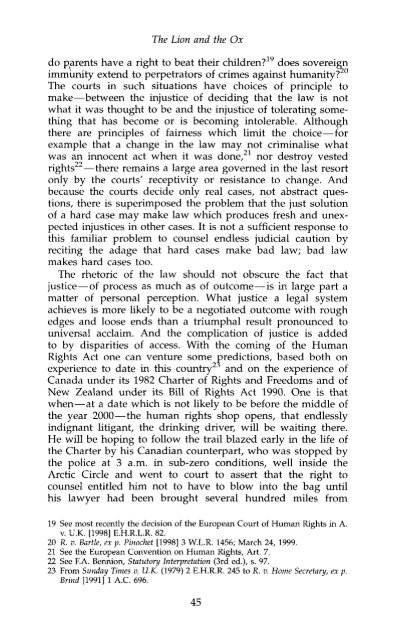LECTURES - College of Social Sciences and International Studies ...
LECTURES - College of Social Sciences and International Studies ...
LECTURES - College of Social Sciences and International Studies ...
Create successful ePaper yourself
Turn your PDF publications into a flip-book with our unique Google optimized e-Paper software.
The Lion <strong>and</strong> the Ox<br />
do parents have a right to beat their children? 19 does sovereign<br />
immunity extend to perpetrators <strong>of</strong> crimes against humanity r°<br />
The courts in such situations have choices <strong>of</strong> principle to<br />
make—between the injustice <strong>of</strong> deciding that the law is not<br />
what it was thought to be <strong>and</strong> the injustice <strong>of</strong> tolerating something<br />
that has become or is becoming intolerable. Although<br />
there are principles <strong>of</strong> fairness which limit the choice—for<br />
example that a change in the law may not criminalise what<br />
was an innocent act when it was done, 21 nor destroy vested<br />
rights 22 —there remains a large area governed in the last resort<br />
only by the courts' receptivity or resistance to change. And<br />
because the courts decide only real cases, not abstract questions,<br />
there is superimposed the problem that the just solution<br />
<strong>of</strong> a hard case may make law which produces fresh <strong>and</strong> unexpected<br />
injustices in other cases. It is not a sufficient response to<br />
this familiar problem to counsel endless judicial caution by<br />
reciting the adage that hard cases make bad law; bad law<br />
makes hard cases too.<br />
The rhetoric <strong>of</strong> the law should not obscure the fact that<br />
justice—<strong>of</strong> process as much as <strong>of</strong> outcome—is in large part a<br />
matter <strong>of</strong> personal perception. What justice a legal system<br />
achieves is more likely to be a negotiated outcome with rough<br />
edges <strong>and</strong> loose ends than a triumphal result pronounced to<br />
universal acclaim. And the complication <strong>of</strong> justice is added<br />
to by disparities <strong>of</strong> access. With the coming <strong>of</strong> the Human<br />
Rights Act one can venture some predictions, based both on<br />
experience to date in this country 2 <strong>and</strong> on the experience <strong>of</strong><br />
Canada under its 1982 Charter <strong>of</strong> Rights <strong>and</strong> Freedoms <strong>and</strong> <strong>of</strong><br />
New Zeal<strong>and</strong> under its Bill <strong>of</strong> Rights Act 1990. One is that<br />
when—at a date which is not likely to be before the middle <strong>of</strong><br />
the year 2000—the human rights shop opens, that endlessly<br />
indignant litigant, the drinking driver, will be waiting there.<br />
He will be hoping to follow the trail blazed early in the life <strong>of</strong><br />
the Charter by his Canadian counterpart, who was stopped by<br />
the police at 3 a.m. in sub-zero conditions, well inside the<br />
Arctic Circle <strong>and</strong> went to court to assert that the right to<br />
counsel entitled him not to have to blow into the bag until<br />
his lawyer had been brought several hundred miles from<br />
19 See most recently the decision <strong>of</strong> the European Court <strong>of</strong> Human Rights in A.<br />
v. U.K. [1998] E.H.R.L.R. 82.<br />
20 R. v. Bartle, ex p. Pinochet [1998] 3 W.L.R. 1456; March 24, 1999.<br />
21 See the European Convention on Human Rights, Art. 7.<br />
22 See F.A. Bennion, Statutory Interpretation (3rd ed.), s. 97.<br />
23 From Sunday Times v. U.K. (1979) 2 E.H.R.R. 245 to R. v. Home Secretary, ex p.<br />
Brind ]1991] 1 A.C. 696.<br />
45

















